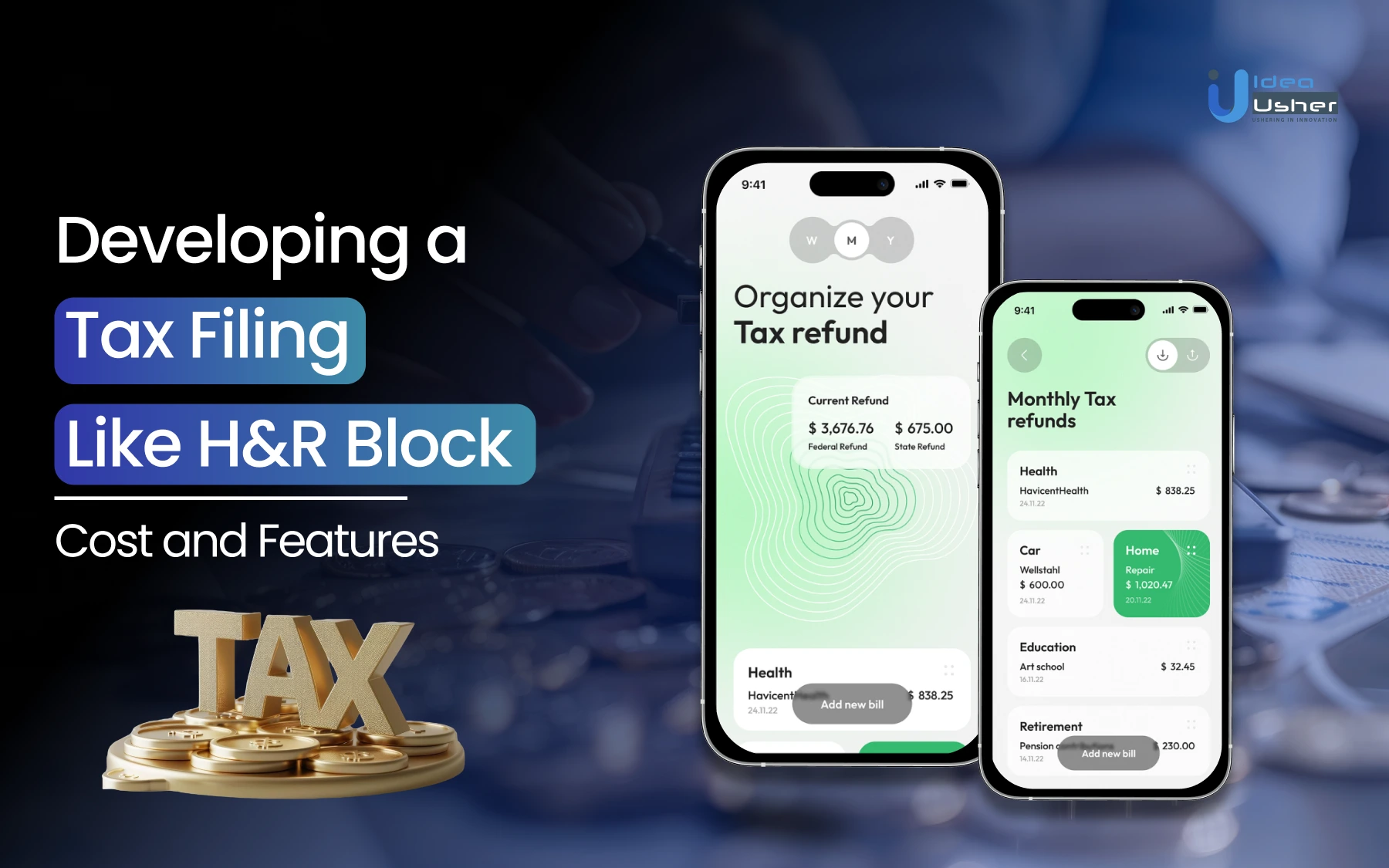Filing taxes is often a time-consuming and stressful process for individuals and businesses alike. Navigating through complex tax codes, ensuring accuracy, and meeting deadlines can turn tax season into a daunting task. This is where tax filing platforms like H&R Block come into play, simplifying the process with user-friendly interfaces and expert guidance. These platforms streamline the entire process, from data input to e-filing, helping users avoid errors and maximize refunds. By leveraging automation and AI, they make tax filing more accessible and less burdensome for all.
The global tax management software market was valued at USD 15.89 billion in 2023 and is projected to grow from USD 17.92 billion in 2024. The demand for tax filing apps is experiencing significant growth, driven by the increasing need for convenience and accuracy. This blog will guide you through the key features and development costs of creating a tax filing platform like H&R Block, helping you understand what it takes to succeed in this expanding market.
Key Market Takeaways of Tax Management Software
According to Verified Market Research, the Tax Management Software Market size was valued at USD 21.34 Billion in 2024 and is projected to reach USD 49.79 Billion by 2031, growing at a CAGR of 11.17% from 2024 to 2031. Tax management software is utilized across various sectors, including accounting firms, small enterprises, freelancers, and large corporations, to enhance financial decision-making, ensure tax compliance, and boost overall efficiency in tax-related processes.
Source: VerifiedMarketResearch
Tax management software is increasingly incorporating AI and machine learning technologies to automate complex tax calculations, identify optimization opportunities, and predict future tax liabilities. This trend enhances accuracy, reduces human error, and provides strategic insights for tax planning.
North America is projected to lead the market throughout the forecast period. In particular, the United States benefits from an advanced technological infrastructure that facilitates the swift adoption and development of sophisticated tax management systems. This technological edge allows the region to maintain its dominant position in the market. The demand for tax management software stems from the intricate tax regulations in the United States and Canada, which encompass multi-layered federal, state, and local tax systems. As a result, businesses and individuals are seeking efficient methods to navigate this complexity and ensure compliance.
Work with Ex-MAANG developers to build next-gen apps schedule your consultation now
Overview of Tax Filing Platform H&R Block?
Tax filing platforms are digital tools that simplify tax return preparation and submission. They offer features like automated calculations and e-filing. These platforms guide users through each step of the process. They help users navigate complex tax regulations more easily. Individuals can use them for personal tax management. Self-employed professionals use them to handle business expenses. Companies of all sizes also benefit from using these platforms.
H&R Block is a leading tax preparation service that assists individuals and businesses in navigating the complexities of tax filing. With options for online and in-person assistance, it caters to a diverse clientele seeking to manage their tax obligations efficiently. The platform is known for its user-friendly interface and comprehensive resources designed to maximize refunds and ensure compliance.
Features of H&R Block:
- User-Friendly Interface: H&R Block is designed with the user in mind, offering an intuitive interface that simplifies the tax filing process. The layout is organized and easy to navigate, allowing users to find the information they need quickly.
- Step-by-Step Guidance: One of the standout features of H&R Block is its step-by-step guidance throughout the tax preparation process. The platform walks users through each phase of filing, ensuring that all necessary information is collected and correctly entered.
- Automated Calculations: H&R Block utilizes advanced software to perform automated calculations, which minimizes the risk of human error in tax filings. Users can trust that their figures are accurate, as the system automatically updates calculations based on the information entered.
- In-Person Assistance: For individuals who prefer face-to-face interaction or require more personalized support, H&R Block offers the option of in-person assistance at numerous locations nationwide. Users can consult with certified tax professionals who can provide tailored advice and ensure that all aspects of their tax situation are addressed.
- Max Refund Guarantee: H&R Block stands out with its Max Refund Guarantee, assuring users that they will receive the maximum refund possible for their tax situation. If a user finds a larger refund elsewhere, H&R Block will refund the preparation fees.
How Profitable Are Tax Filing Platforms Like H&R Block?
Platforms like H&R Block can be very profitable for entrepreneurs entering the tax market. The business model is both recurring and scalable. H&R Block has reported over $3 billion in annual revenues recently. Much of this revenue comes from online tax filing services. Additional income comes from premium services, like expert consultations and audit support. These platforms attract users with a mix of free and paid services. Many users choose to pay for premium features or advanced filing options. This approach helps build a broad and loyal customer base.
Additionally, these platforms have the potential to diversify revenue streams beyond tax filing. Entrepreneurs can offer complementary financial products like tax refund advances, loans, and bookkeeping services, which not only increase revenue but also attract more customers. Leveraging technology like automation, artificial intelligence, and cloud-based solutions can streamline operations, reduce costs, and improve customer satisfaction. This combination of recurring revenue, diversified services, and cost-efficient technology makes tax filing platforms a highly attractive and profitable venture for entrepreneurs and businesses aiming to build a scalable, reliable business model.
Here are some examples of profitable tax filing platforms:
TurboTax: Owned by Intuit, TurboTax is the leading tax software platform, generating billions annually. In 2023, Intuit’s entire financial suite, which includes TurboTax, QuickBooks, and Mint, brought in over $14 billion, with a large portion of that revenue coming from TurboTax during the tax season.
TaxAct: Tax is a strong competitor in the tax filing space, generating $100 million in revenue annually. It serves a broad audience with its DIY tax preparation options and more comprehensive paid services.
Business and Revenue Model of Tax Filing Platform H&R Block
H&R Block operates a diversified business model that caters to various customer needs, making it a highly resilient and profitable company. The company’s core focus revolves around offering a broad spectrum of tax-related services while also expanding into other financial products and franchise operations, ensuring multiple streams of revenue. Let’s have a look at their business model.
Tax Preparation Services
Offers personalized assistance at physical offices across the U.S., where tax professionals help clients with accurate tax filing. Provides digital tax filing software that allows customers to file taxes from home with guided assistance and features like automatic data entry. Offers tools for customers who prefer to file their taxes independently, including templates, calculators, and guidance.
Tax Advice and Planning
Provides expert tax advice for individuals and businesses, helping clients understand tax laws, identify deductions, and minimize tax liabilities. Focuses on long-term tax strategies by reviewing clients’ financial situations and recommending ways to optimize tax positions over time.
Financial Services
Offers a variety of insurance products, including auto, home, life, and small business insurance, available both online and in-person.Provides services that help clients achieve long-term financial goals through retirement planning, investment strategies, and account management.
Franchise Operations
Allows individuals and businesses to operate tax preparation offices under the H&R Block brand, with franchisees benefiting from training, support, and brand recognition.
Revenue Streams
Tax Preparation Fees: Generates income from in-person, online, and DIY tax filing services.
Tax Advice and Planning Fees: Earns revenue from providing tax advice and long-term tax planning strategies.
Insurance Sales: Generates revenue from the sale of various insurance products.
Retirement Planning Fees: Offers retirement planning services that add to the company’s revenue.
Franchise Fees: Franchisees contribute to revenue through fees for operating under the H&R Block brand.
Are Tax Filing Platforms Confidential?
Tax filing platforms prioritize confidentiality by implementing advanced technical measures to safeguard sensitive user data. They utilize encryption protocols, such as SSL and TLS, to protect data transmitted between users and the platform. These protocols ensure that personal information, including Social Security numbers and financial details, is encrypted during transmission, making it virtually impossible for unauthorized parties to intercept or access the information. Additionally, tax filing platforms often employ robust authentication methods, such as 2FA, to further enhance security by requiring users to verify their identity through multiple steps before accessing their accounts.
Moreover, data storage practices are crucial for maintaining confidentiality. Leading tax filing platforms store user data on secure servers with restricted access, employing firewalls and intrusion detection systems to thwart potential breaches. Regular security audits and compliance with regulations, such as the GDPR and HIPAA, are also vital in ensuring that these platforms meet high standards of data protection. By adhering to these protocols and regulations, tax filing platforms can provide users with confidence that their sensitive information is being handled with the utmost care and confidentiality.
Steps to Develop a Tax Filing Platform Like H&R Block
Developing a tax filing platform like H&R Block requires careful planning and execution to ensure it meets user expectations and industry standards. By following these steps, you can develop a tax filing platform that not only meets users’ needs but also ensures security, compliance, and scalability in the highly regulated tax industry.
Step 1: Market Research and Target Audience Analysis
Begin by conducting thorough market research to understand the demand, competition, and user preferences in the tax filing industry. Identify your target audience, which could range from individual taxpayers to small businesses. This research will help shape the app’s structure, UX, and features tailored to meet the needs of your users.
Step 2: Defining Core Functionalities and Workflow
Outline the core functionalities of the app, such as user registration, secure data input, tax document uploads, and e-filing. Decide on the workflow—how users will navigate through the app. The user journey should be intuitive, starting from signing up to submitting tax returns. Focus on creating a seamless flow, integrating guided assistance and real-time feedback for users throughout the process.
Step 3: Compliance with Legal and Regulatory Requirements
Tax preparation involves handling sensitive financial data and adhering to strict regulations. Consult legal experts to ensure your app complies with local tax laws, the IRS’s electronic filing system, and data protection regulations (e.g., GDPR, CCPA). This step ensures your platform operates within the legal framework and maintains user trust.
Step 4: Security and Data Encryption Measures
Given the sensitive nature of tax information, building strong security features is essential. Incorporate advanced encryption protocols, multi-factor authentication, and secure cloud storage to safeguard user data. Implement end-to-end encryption for data transmission and ensure that your servers are safe and regularly audited for vulnerabilities.
Step 5: Choosing the Right Technology Stack
Select the technology stack that aligns with your platform’s goals. This includes choosing the programming languages, frameworks, databases, and cloud services. For example, using robust back-end frameworks like Node.js or Python, paired with front-end technologies like React or Flutter for a smooth mobile experience, can enhance the app’s performance and scalability.
Step 6: Building a Scalable Infrastructure
Tax filing platforms must handle large volumes of data, especially during peak tax season. Develop a backend that is scalable and can accommodate sudden traffic spikes. Cloud-based infrastructures like AWS or Google Cloud can offer the flexibility and scalability needed. Ensure that the database can store and process large amounts of tax data securely and efficiently.
Step 7: Integrating Third-Party Services
Incorporate essential third-party services like tax calculators, APIs for IRS e-filing, and payment gateways for users to pay for premium services. Ensure that these integrations are seamless and work efficiently with your app. Partnering with financial institutions to offer tax refund advances or other financial products can also enhance the platform’s value proposition.
Step 8: Interface Development
Focus on designing a user-friendly interface that simplifies complex tax processes. Ensure that the design is intuitive clean, and provides step-by-step guidance for users. Utilize wireframing tools to create prototypes and conduct usability testing to refine the design before full-scale development. The user interface (UI) should also be optimized for both mobile and desktop versions to cater to diverse user preferences.
Step 9: Testing and QA
Perform rigorous testing throughout the development process to ensure the platform functions smoothly and is free of bugs. Use automated testing tools alongside manual testing to check the app’s performance under different scenarios—especially during high-traffic periods like tax season. Security testing is also crucial to ensure there are no vulnerabilities that could compromise sensitive tax data.
Cost of Developing a Tax Filing Platform Like H&R Block
| Development Phase | Details | Cost Range |
| Research and Development | Tax research, competitive analysis, tech stack selection. | $2,000 – $8,000 |
| Frontend Development | UI design and development using frameworks like React. | $3,000 – $15,000 |
| Backend Development | Server-side setup, API creation, database management. | $4,000 – $20,000 |
| App Features | Basic calculators, data import, mobile app versions. | $3,000 – $25,000 |
| Testing & QA | Unit, integration, and user testing. | $1,000 – $5,000 |
| UI/UX Design | User experience and visual design refinement. | $2,000 – $8,000 |
| Total Estimated Cost | Overall cost ranges from, varying by features and scope. | $10,000 to $100,000 |
Factors Affecting the Cost of Developing a Tax Filing Platform Like H&R Block
- Tax Law Complexity: The intricate nature of tax laws and regulations across different jurisdictions plays a major role in determining development costs. This often requires collaboration with tax experts and frequent updates to keep up with changes, adding both time and expense to the project.
- Government Integrations: A critical aspect of any tax filing platform is the ability to integrate with government agencies for seamless tax return filing and data verification. Each integration point needs to be thoroughly tested and maintained, contributing to higher initial and ongoing costs.
- Security Requirements: Protecting sensitive user data, including social security numbers and financial information, is essential for tax filing platforms. Meeting these high-security standards increases both the development time and the maintenance expenses.
- Compliance Requirements: Adhering to regulations such as GDPR, CCPA, and other data privacy laws is mandatory for tax filing platforms that handle personal information. Ongoing updates and audits are also necessary to maintain compliance as regulations evolve, contributing to continuous operational expenses.
Conclusion
From my perspective, developing a tax filing platform like H&R Block requires balancing user needs and technology. It also involves ensuring compliance with tax regulations. The initial investment may seem high but is essential. This ensures the platform is secure, user-friendly, and reliable. With increasing demand for digital tax solutions, market expansion is possible. Investing in such a platform could be strategic for new businesses. Adding advanced features like automated calculations and seamless government integrations adds value. High-level security can simplify tax filing and improve accuracy for users.
How Can Idea Usher Help?
At Idea Usher, we understand the challenges that business owners and entrepreneurs face when creating a tax filing platform like H&R Block. With over 500,000 hours of coding experience in app development, we’re uniquely positioned to turn your vision into a reality. Our team is dedicated to building a secure, user-friendly platform that simplifies complex tax processes while ensuring compliance with the latest regulations.
We’ll work closely with you, from initial concept to final deployment, providing tailored solutions that fit your business needs. Let us help you create a robust platform that stands out in the competitive market and meets the needs of today’s digital-savvy users. For more information, check out our services page!
Work with Ex-MAANG developers to build next-gen apps schedule your consultation now
FAQs
How do you ensure data security on a tax filing platform?
Data security is critical for a tax filing platform due to the sensitive nature of user information. Implementing encryption, secure user authentication, and regular security audits ensures that user data remains protected. Compliance with data privacy laws like GDPR and CCPA is also crucial for maintaining user trust.
Why should I integrate my platform with government tax systems?
Integrating with government tax systems allows users to file their taxes directly through the platform, simplifying the process and reducing manual entry errors. It also enables the platform to access official data for verification, making the filing process more accurate and efficient.
How do you keep the platform up-to-date with changing tax laws?
To stay compliant with the latest tax regulations, we recommend working closely with tax experts and implementing an update mechanism in the platform. This enables quick updates whenever tax laws change, ensuring users always have access to accurate, compliant tax filing tools.
Can I develop a mobile version of the tax filing platform?
Yes, developing a mobile version is highly recommended as it increases user accessibility and convenience. A mobile app can allow users to file taxes on the go, track their refunds, and access support directly from their smartphones.























